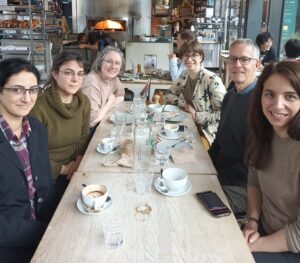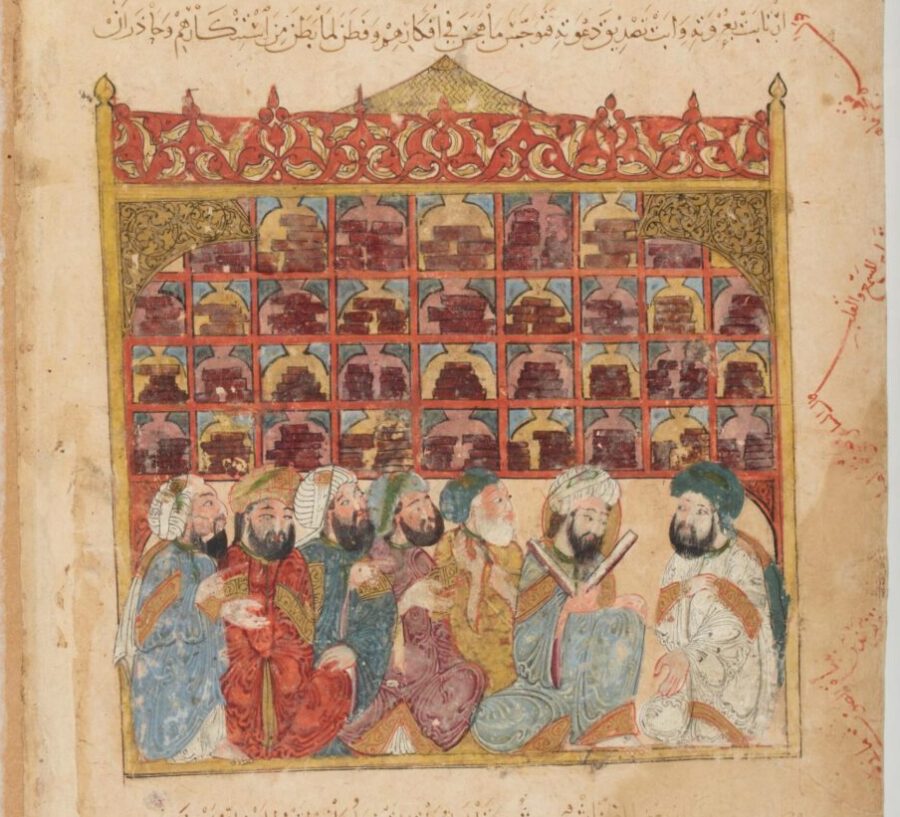On 13th and 14th November, the Caliphal Finances team had the immense pleasure of hosting Matthew Gordon, Emeritus Professor of Miami University, Oxford, Ohio, and Eugénie Rébillard, researcher at the Institut français du Proche-Orient (Ifpo) in Beirut. The workshop focused on agents of the fiscal administration in the ninth century and the Egyptian economy in the second half of the ninth century.
On Wednesday morning, 13th November, we gathered in PI Marie Legendre’s office. All team members were present except for PhD student George, who is currently spending the semester at Harvard University and joined online for the afternoon sessions. Marie began by presenting an overview of the Caliphal Finances project and explaining her motivations for launching it. Marie and postdoc Eline Scheerlinck then shared updates on the work they have been conducting on the project so far.
The next segment centred on postdoc Noëmie Lucas’ ongoing research into fiscal administrators in Egypt, a key element of her work package 4. She has been building a chronological overview of the aṣḥāb al-kharāj, or finance directors, of the Egyptian province, drawing from both literary sources and papyri. For the purposes of Eugénie and Matthew’s visit, she focused on the latter half of the ninth century, a period with which both scholars have extensive expertise. We had a productive exchange about the differing perspectives offered by the literary sources compared to those found in fiscal documents. Matthew suggested viewing fiscal administration as a fluid and contingent system rather than a fixed structure, a notion reflected in Noëmie’s list of finance directors, where the rationale behind appointments and the hierarchy of (fiscal) administrators appear to vary considerably both chronologically and geographically.

Part of the Caliphal Finances team and our guests Eugénie Rébillard and Matthew Gordon at lunch, 13th November.
As usual, our discussions continued over lunch. In the afternoon, we turned to our guest Eugénie Rébillard’s work on the police force in ninth-century Iraq, the topic of her PhD dissertation and forthcoming book. We explored the activities of state agents of the police involved in tax collection in rural Iraqi regions, examining the requisitions imposed by these agents and drawing potential parallels with fiscal mechanisms in early Islamic Egypt. Many insights from our discussions highlighted the need to reevaluate the post-fourth fitna period as one marked by shifts and as a driving period of state formation.
On Thursday, 14th November, we began the day by delving into PhD student Dalia’s research on qabāla and ḍamān, two mechanisms of Abbasid fiscal administration. Her work spurred rich discussions on the nature of private and public land ownership and the relevance of these categories within our field’s scholarship. We also examined various roles within the hierarchy of fiscal collection in Abbasid Egypt and discussed how fiscal documents on papyrus can help reconstruct this structure.

Part of the Caliphal Finances team with Matthew and Eugénie in PI Marie Legendre’s office after a full day of discussions, 14th November.
In the afternoon, we turned our attention to Matthew Gordon’s work on Aḥmad ibn Ṭūlūn’s life, policies, and the political, economic, and fiscal contexts of his rise to power. This session included exploring how Egypt, with its potential wealth of revenues, was perceived at the imperial centre. One recurring theme over the two days was the importance of understanding Egypt’s connections to the imperial centre and the wider empire to fully grasp the workings of the Egyptian fiscal administration in the ninth century.
The Caliphal Finances team is immensely grateful for the opportunity to engage with our guests on topics related to fiscal administrators and various aspects of ninth-century fiscal practice, which lie at the heart of the project. These stimulating conversations will undoubtedly continue well beyond these two fruitful days.
Banner image: Ḥarīrī, A. & Wāsiṭī, Y. I. M. (1236) The Assemblies of al-Hariri. [Place of Publication Not Identified: Publisher Not Identified, to 1237] Retrieved from the Library of Congress, https://www.loc.gov/item/2021667393/.




Leave a Reply